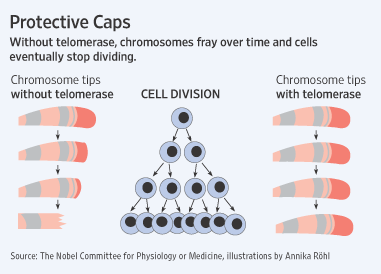 “Two mice involved in an experiment on age-related degeneration. Mice whose telomerase gene was activated, left, showed notable improvements.” Source of caption: print version of the WSJ article quoted and cited below. Source of photo: online version of the WSJ article quoted and cited below.
“Two mice involved in an experiment on age-related degeneration. Mice whose telomerase gene was activated, left, showed notable improvements.” Source of caption: print version of the WSJ article quoted and cited below. Source of photo: online version of the WSJ article quoted and cited below.
(p. A3) Scientists have partially reversed age-related degeneration in mice, an achievement that suggests a new approach for tackling similar disorders in people.
By tweaking a gene, the researchers reversed brain disease and restored the sense of smell and fertility in prematurely aged mice. Previous experiments with calorie restriction and other methods have shown that aspects of aging can be slowed. This appears to be the first time that some age-related problems in animals have actually been reversed.
The study was published online Sunday in the peer-reviewed journal Nature.
“These mice were equivalent to 80-year-old humans and were about to pass away,” says Ronald DePinho, co-author of the paper and a scientist at Dana-Farber Cancer Institute in Boston. After the experiment, “they were the physiological equivalent of young adults.”
For the full story, see:
GAUTAM NAIK. “Aging Ills Reversed in Mice; Scientists Tweak a Gene and Rejuvenate Cells, Raising Hopes for Uses in Humans.” The Wall Street Journal (Mon., NOVEMBER 29, 2010): A3.
(Note: online version of the article is dated NOVEMBER 28, 2010.)

Source of graphic: online version of the WSJ article quoted and cited above.

